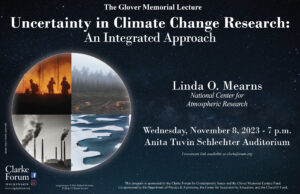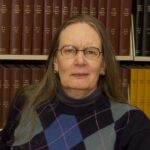Anita Tuvin Schlechter Auditorium, 7 p.m.
 The Glover Memorial Lecture
The Glover Memorial Lecture
Uncertainty in Climate Change Research: An Integrated Approach
Linda Mearns, Senior Scientist in the Research Applications Lab of the National Center for Atmospheric Research
Uncertainty is a factor in all phases of climate change research regarding the future from projections of regional climate change, to the various impacts of climate change, through the economics of climate change. All these uncertainties need to be considered when approaching the complete problem of climate change. We start from the consideration of decision making under uncertainty, and then consider the nature of uncertainty in the different parts of the problem.
This program is sponsored by the Clarke Forum for Contemporary Issues and the Glover Memorial Lecture Fund and co-sponsored by the Department of Physics & Astronomy, the Center for Sustainability Education, and the Churchill Fund. It is also part of the Clarke Forum’s Leadership in an Age of Uncertainty Series.
Biography (provided by the speaker)
 Linda O. Mearns is a senior scientist in the Research Applications Lab of the National Center for Atmospheric Research, Boulder, Colorado. She previously served as director of the Weather and Climate Impacts Assessment Science Program (WCIASP) for 15 years and director of the Regional Climate Uncertainty Program (RCUP) for three years. She currently leads the Regional Integrated Sciences Collective (RISC) within the Research Applications Lab. She served as director of the Institute for the Study of Society and Environment (ISSE) for three years ending in April 2008. She holds a Ph.D. in geography/climatology from UCLA. She has performed research and published mainly in the areas of regional climate change, climate change scenario formation, quantifying uncertainties, and climate change impacts on agro-ecosystems. She has particularly worked extensively with regional climate models. She has been an author in the IPCC Climate Change 1995, 2001, 2007, and 2013/14 and 2021/22, both in WGI and WGII Assessments regarding climate variability, impacts of climate change on agriculture, regional projections of climate change, climate scenarios, and uncertainty in future projections of climate change. She has also participated in all of the US National Climate Assessments either as an author or review editor. She led the multi-agency supported North American Regional Climate Change Assessment Program (NARCCAP), and is co-Chair of the North American CORDEX Program. She has been a member of the National Research Council Climate Research Committee (CRC), the NAS Human Dimensions of Global Change (HDGC) Committee, the NAS Panel on Adaptation of the America’s Climate Choices Program, and the National Academy of Sciences Panel on Advancing Climate Modeling. She has worked extensively with resource managers (e.g., water resource managers and ecologists) to form climate change scenarios for use in adaptation planning. She was made a fellow of the American Meteorological Society in January 2006. She received the American Association of Geographers Life Time Achievement Award in 2015 and the Excellence in Research Award in 2016. She currently is on the advisory panel of the USGCRP, the NASEM board of Atmospheric Science and Climate (BASC), and member of the Board on Environmental Health (BEH) of the AMS.
Linda O. Mearns is a senior scientist in the Research Applications Lab of the National Center for Atmospheric Research, Boulder, Colorado. She previously served as director of the Weather and Climate Impacts Assessment Science Program (WCIASP) for 15 years and director of the Regional Climate Uncertainty Program (RCUP) for three years. She currently leads the Regional Integrated Sciences Collective (RISC) within the Research Applications Lab. She served as director of the Institute for the Study of Society and Environment (ISSE) for three years ending in April 2008. She holds a Ph.D. in geography/climatology from UCLA. She has performed research and published mainly in the areas of regional climate change, climate change scenario formation, quantifying uncertainties, and climate change impacts on agro-ecosystems. She has particularly worked extensively with regional climate models. She has been an author in the IPCC Climate Change 1995, 2001, 2007, and 2013/14 and 2021/22, both in WGI and WGII Assessments regarding climate variability, impacts of climate change on agriculture, regional projections of climate change, climate scenarios, and uncertainty in future projections of climate change. She has also participated in all of the US National Climate Assessments either as an author or review editor. She led the multi-agency supported North American Regional Climate Change Assessment Program (NARCCAP), and is co-Chair of the North American CORDEX Program. She has been a member of the National Research Council Climate Research Committee (CRC), the NAS Human Dimensions of Global Change (HDGC) Committee, the NAS Panel on Adaptation of the America’s Climate Choices Program, and the National Academy of Sciences Panel on Advancing Climate Modeling. She has worked extensively with resource managers (e.g., water resource managers and ecologists) to form climate change scenarios for use in adaptation planning. She was made a fellow of the American Meteorological Society in January 2006. She received the American Association of Geographers Life Time Achievement Award in 2015 and the Excellence in Research Award in 2016. She currently is on the advisory panel of the USGCRP, the NASEM board of Atmospheric Science and Climate (BASC), and member of the Board on Environmental Health (BEH) of the AMS.
The Glover Memorial Lecture
The Glover Memorial Lectures are usually presented in alternate years. This lectureship in science was established in 1958 in memory of John Glover of Newcastle-upon-Tyne, England, the inventor of the Glover Tower, and in memory of his son and grandson, Henry and Lester Glover, by the late Dr. John D. Yeagley and Mrs. Blanche Yeagley of York, Pennsylvania. Recent Glover Lectures include Peter Brancazio’s “Sports on the Moon,” Clint Sprott on “The New Science of Chaos,” Dr. Dorrit Hoffleit’s presentation on “A Century of Women in Astronomy,” Lawrence Krauss’ lecture on “The Physics of Star Trek,” Albert Bartlett’s lecture on “Arithmetic, Population, and Energy,” David Lee’s lecture on “Superconductivity and Superfluidity: A Century of Discovery,” Rush Holt’s lecture on “Advancing Science” and Gabriela González’s lecture on “Einstein, Black Holes and Gravitational Waves.”
